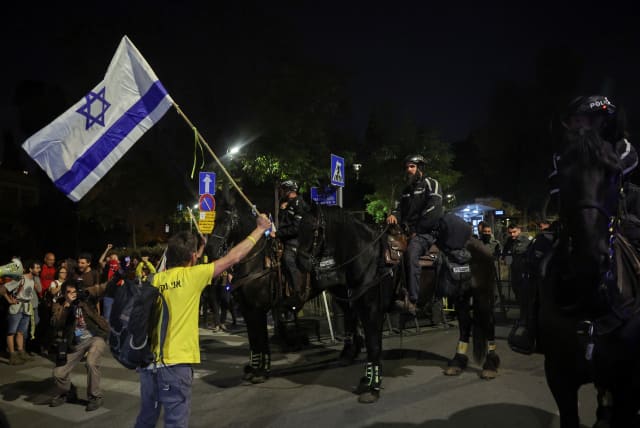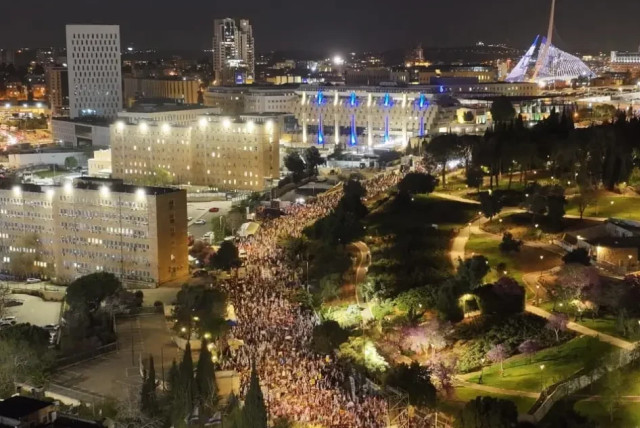Are Israeli protests helping Hamas?

Despite debates over anti-government protests, true unity comes with accepting opinions different than ours and the right of free speech and protest.
Starting on Sunday, masses descended on Jerusalem for four days of protests advocating for the return of hostages and against the government in the lead-up to the Knesset’s regularly scheduled recess beginning Wednesday. With the return of mass anti-government protests, those saying that the protests are helping Hamas and Israel’s enemies by making Israel seem weak and divided have also returned. We’ve heard it from politicians and leaders, from people on the street, and from our friends, but as the adage goes, these people are fighting the last war.
We are unlikely to ever know the effect of the pre-October 7 protests on the Hamas attack. Regardless of these possible influences, post-October 7, the cracks in Israeli society have already been shown, and no amount of “unity” will convince Israel’s enemies that this togetherness extends beyond the superficial. Israel has an emergency unity government, which is temporary almost by definition. The haredi draft bill is casting a spotlight on the fact that only part of Israeli society is tasked with its defense, and polls show that the people overwhelmingly do not have faith in the government. No amount of Beyachad Nenatzeach (“Together We Will Win”) stickers will make these issues disappear.
The question of whether or not the protest movement drove Israel to an existential crisis by threatening to leave its defense systems was answered on October 7, when protesters showed up for IDF reserve duty en masse.
We are already at war; the terror organizations and countries that seek to destroy us already know about the disagreements rocking this country. This is the war that we have already lost. The war we must turn to now, if we want to appear as a single front to our enemies, is the war for a country that is healed, whose society is unified or at least knows how to live together. The only way to do this is to tackle the social issues that we’ve been kicking down the road for decades.
This is what the protesters seek to do. There are numerous ways to fight for and work for a better society, and protesting is certainly one of them.
It is also far from obvious that the protests were divisive. What many of those calling the protests divisive mean is that they do not agree with what the protesters are saying, but how much you agree with a statement is not a measure of divisiveness. The protest movement has united a vast cross-section of Israeli society from multiple geographic and political corners of the country. Protests brought the hawkish army-veteran group Brothers in Arms together in coalitions with left-wing, anti-war protesters calling for peace and an “end to occupation.” This coalition building and work in the name of common goals, despite deep differences, is exactly the type of work Israeli society must do.
Debates project health of democracy to the world
The protests also lent Israel essential credibility in the eyes of the world, which it needs if it wants global legitimacy to fight the Israel-Hamas war. Moody’s, in its downgrade of Israel’s credit rating, took very positive note of the protests, saying that they provided strong checks and balances. The V-Dem Institute’s 2024 Democracy Report removed Israel’s categorization as a liberal democracy for the first time in 50 years, in part due to “government attacks on the judiciary.” This attack was mostly countered by protests. European coverage of Israeli protests showed a side of Israel not often spoken about there – the liberal side, fighting for equal rights for all. The Israeli media took notice of this change in coverage, showcasing European headlines about Israel as a liberal democracy. Israel’s standing in the world as a credible liberal democracy is vital to ensuring the continued support of its allies in the war against Hamas.
Those who say that the protests are hurting the war effort are also leaving out an important part of the story. For the first days and even weeks of the war, evacuees and other victims of the Hamas attack expressed the sentiment that the government was nowhere to be found. Israel’s civil society stepped in almost immediately to provide help. Within two days, the main protest coalition formed a civilian “war room,” which supplied everything from clothing, food, and shelter to evacuees to food, uniforms, and tactical gear to soldiers. Thousands of volunteers collected and purchased gear, while thousands more drove this gear around the country to soldiers and civilians in the North and South. This unbelievably quick mobilization could not have happened without the pre-existing structure and networks that the protesters had formed.
The idea that the protests are hurting the war effort or helping Hamas is a nice one if you don’t want protests or the changes they might bring or if you don’t agree with what the protesters are saying, but that doesn’t mean that this talking point, no matter how many times it is repeated, is true. True unity comes with the acceptance of opinions other than our own and the right of those who hold them to free speech and protest.
Jerusalem Post Store
`; document.getElementById("linkPremium").innerHTML = cont; var divWithLink = document.getElementById("premium-link"); if (divWithLink !== null && divWithLink !== 'undefined') { divWithLink.style.border = "solid 1px #cb0f3e"; divWithLink.style.textAlign = "center"; divWithLink.style.marginBottom = "15px"; divWithLink.style.marginTop = "15px"; divWithLink.style.width = "100%"; divWithLink.style.backgroundColor = "#122952"; divWithLink.style.color = "#ffffff"; divWithLink.style.lineHeight = "1.5"; } } (function (v, i) { });

